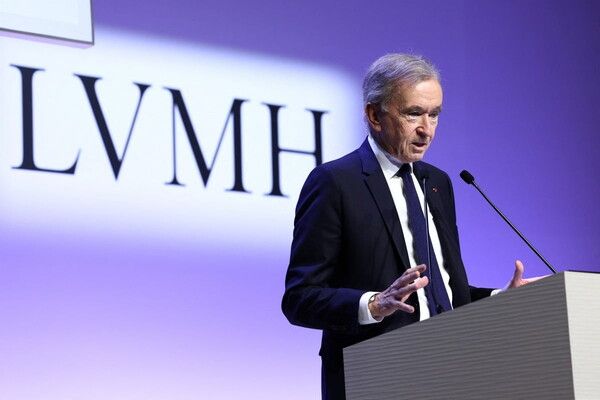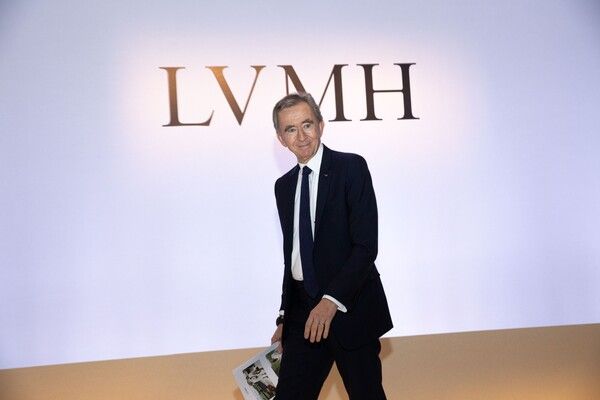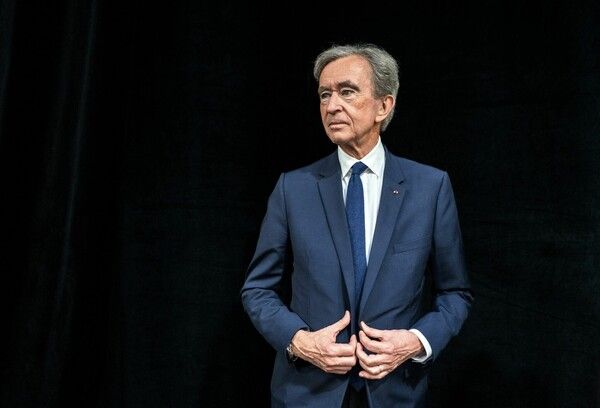
[CEONEWS=Reporter Oh Young-joo] When thinking of the world’s top 10 billionaires, names like Jeff Bezos and Bill Gates often come to mind, as most are American. However, among the few French individuals to reach this elite status is Bernard Arnault.
Bernard Arnault was born on March 5, 1949, in Roubaix, Nord, in the Hauts-de-France region of France. His father was an engineer who graduated from the prestigious Grande École, École Centrale Paris.
After receiving an engineering education, Arnault joined his father’s construction company, where he diligently learned the ropes of business management. By 1979, he became the company’s CEO.
During this period, France saw the rise of Socialist policies under President François Mitterrand, who was elected from the French Socialist Party. Disillusioned by these policies, Arnault turned his attention to the United States, seeking opportunities in a more business-friendly environment.
"The Wolf in a Cashmere Coat"... The Secret to His Success?
After venturing into the United States, Bernard Arnault had a chance conversation with a New York taxi driver. During their chat, the driver admitted he didn’t know Charles de Gaulle, the former French president, but recognized the luxury brand Dior. This revelation left a lasting impression on Arnault and sparked his interest in the luxury industry.
In 1984, Arnault learned that Boussac, the parent company of Christian Dior, was up for sale. Armed with the knowledge he gained from his time in New York, Arnault jumped into the acquisition battle, determined to secure the deal. He invested $95 million to acquire Boussac, marking his official entry into the luxury fashion industry.
Arnault pledged to “preserve jobs and revive the business,” but his actions told a different story. He sold off much of the company’s operations and reduced Boussac’s workforce by 8,000 employees. Despite the drastic measures, he turned the company profitable within just two years.
However, his bold and unapologetic actions earned him a controversial reputation. The media, unimpressed by what they perceived as a brash, American-style attitude, labeled him “the wolf in a cashmere coat”—akin to the phrase “a wolf in sheep’s clothing.”
Unfazed by criticism, Arnault pressed on with his belief that acquiring established brands was more valuable than launching new ones. At the time, most luxury brands were family-run businesses, each focused on a single brand. Arnault’s aggressive acquisition strategy began to reshape the industry.
One such turning point came when Louis Vuitton and Moët Hennessy merged to form LVMH. The merger, however, soon led to a power struggle between Henri Racamier, a vice president from Louis Vuitton, and Alain Chevalier, the chairman from Moët Hennessy. Racamier turned to Arnault for help. Seizing the opportunity, Arnault partnered with Racamier to acquire shares and ousted Chevalier.
Soon after, Arnault went a step further by removing Racamier, the very man who brought him into the fold, and took control of LVMH himself. He accomplished this feat at the age of 40, marking the beginning of his reign over what would become the world’s largest luxury conglomerate.

The Birth of LVMH Through Mergers
LVMH was established in 1987 through the merger of Moët Hennessy, itself formed in 1971 by the merger of Moët & Chandon and Hennessy, with Louis Vuitton. The founders of LVMH were Henri Racamier and Alain Chevalier. One of the unique aspects of LVMH is its governance structure, which resembles the multi-layered ownership structure typical of large family-owned conglomerates.
Currently, 42.36% of LVMH is owned by Financière Jean Goujon, which is wholly owned by Christian Dior. Christian Dior is 69.96% owned by Groupe Arnault, which is controlled by the Arnault family. Additionally, Bernard Arnault directly owns 5.28% of LVMH shares.
LVMH has also invested in South Korean companies, with a notable example being its investment of approximately 61.05 billion won in YG Entertainment. However, following the "Burning Sun Gate" scandal and a sharp drop in YG's stock price, LVMH withdrew its investment.
Despite the global economic downturn caused by the COVID-19 pandemic in 2020, LVMH demonstrated a strong recovery. According to its mid-year performance report released on July 26, the group achieved sales of €28 billion in the first half of the year, a 56% increase compared to the same period the previous year.
The Fashion & Leather Goods division was particularly successful, posting an operating profit of €5.66 billion—more than triple that of the same period the previous year. The Watches & Jewelry division also saw significant growth, with a 122% increase in operating profit compared to 2019, driven by the acquisition of Tiffany & Co.
Among LVMH’s brands, the oldest is Château d'Yquem, a winery established in 1593.
Aggressive Mergers and Acquisitions, and Occasional Failures
Following the establishment of LVMH, Bernard Arnault embarked on a series of aggressive acquisitions. He added renowned fashion houses such as Givenchy, Céline, and Fendi to the group, as well as cosmetics brands like Make Up For Ever and BeneFit Cosmetics. He also expanded into watches and jewelry, acquiring brands like TAG Heuer and Bulgari.
Arnault’s strategy involved acquiring companies that were financially struggling but had strong design capabilities. By preserving the value of these brands and bringing in new designers, he ensured they remained competitive and aligned with market trends.
However, not all of Arnault’s ventures were successful. He failed to acquire luxury giants such as Gucci and Hermès. His aggressive acquisition strategy has also drawn criticism for disrupting the ecosystem of the luxury industry and for frequent layoffs, which have sparked controversy.
Arnault's approach has reshaped the global luxury landscape, making LVMH a dominant force in the industry despite the challenges and criticisms it has faced.

Management Philosophy and Flexible Principles... Tax Avoidance and Evasion?
Bernard Arnault is renowned for his sprawling expansion of brands, yet his continued success is rooted in a few key principles. One of these is his commitment to attracting top talent, exemplified by his recruitment of Marc Jacobs in 1997.
As the profitability of the LVMH group declined in the early 21st century, Arnault demonstrated his adaptability by prioritizing designers’ creativity and individual visions. This shift is considered a hallmark of his flexible management philosophy.
Arnault also revolutionized the luxury market by introducing products at various price points, making luxury more accessible to the middle class while maintaining the prestige of his brands. His strategy included creating opulent store designs to preserve the luxurious image of his products. Furthermore, he ensured each brand retained its independence and unique identity, a move widely praised as a key to LVMH’s success.
However, Arnault faced controversy in 2012 when it was revealed he had applied for Belgian citizenship. The news surfaced as France's President François Hollande proposed raising the top tax rate to 75%. Arnault’s move was widely interpreted as a protest, given Belgium’s lower top tax rate of 53.7%.
As the controversy grew, Arnault released a statement claiming the citizenship request was for business purposes, not tax avoidance. Despite his explanation, public backlash continued, citing his longstanding dissatisfaction with French tax policies. The criticism eventually impacted Louis Vuitton’s brand value, prompting Arnault to withdraw his Belgian citizenship application.
In 2017, Arnault faced further allegations when his name appeared in the Paradise Papers, an international exposé by the International Consortium of Investigative Journalists (ICIJ) revealing offshore tax avoidance by prominent individuals. Arnault countered these allegations by stating that the assets in question were fully declared and subject to French wealth tax.
Now in his 70s, Arnault remains as active and ambitious as ever. Some speculate that he might continue acquiring companies until his final days.
As the saying goes, human desire knows no bounds, and Arnault’s ambition seems limitless. The question remains: What lies at the end of his relentless drive, and who or what will be his next target?
Copyright ⓒ CEONEWS 무단 전재 및 재배포 금지
본 콘텐츠는 뉴스픽 파트너스에서 공유된 콘텐츠입니다.



